
ALGAE
metrics 2024
Unveiling the secrets of algal biodiversity.
Introduction
ALGAE, an esteemed publication by the Korean Society of Phycology, serves as an authoritative platform for researchers and practitioners in aquatic science, ecology, and plant science. Founded in South Korea, this journal has established a commendable reputation, reflected in its Q1 rankings across multiple categories in the 2023 Journal Citation Reports and its impressive Scopus rankings, which position it in the top 20% of its fields. With a scope that encompasses the latest advancements in algal studies, highlighting both fundamental and applied research, ALGAE is crucial for those looking to deepen their understanding of phycology and its implications for biodiversity and ecosystem health. Though not an open-access journal, it provides valuable insights and cutting-edge findings that are vital for the scientific community engaged in ecological and biological research. With its robust trajectory from 2013 to 2024, ALGAE continues to push the boundaries of knowledge and foster innovation within the discipline.
Metrics 2024
 0.72
0.72 3.10
3.10 2.40
2.40 30
30Metrics History
Rank 2024
Scopus
IF (Web Of Science)
JCI (Web Of Science)
Quartile History
Similar Journals
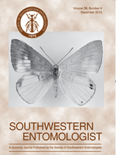
SOUTHWESTERN ENTOMOLOGIST
Bridging Research and Application in Southwestern EntomologySOUTHWESTERN ENTOMOLOGIST is a pivotal academic journal dedicated to advancing the fields of Agronomy, Ecology, and Insect Science. Published by the SOUTHWESTERN ENTOMOLOGICAL SOC in the United States, this journal plays a crucial role in disseminating vital research findings that address pressing ecological and agricultural challenges. With its ISSN 0147-1724 and E-ISSN 2162-2647, the journal has been publishing comprehensive studies since 1993 and continues to contribute significantly to the knowledge base up to 2024. As a Q4 ranked journal in both Agronomy and Crop Science and Ecology, as well as Insect Science, it provides an inclusive platform for researchers and students to share their insights and foster collaborations. Although it currently does not offer open access options, the content is accessible to academic institutions and professionals, ensuring that significant findings reach a broad audience. Given its niche focus, SOUTHWESTERN ENTOMOLOGIST not only appeals to researchers and students but also to professionals looking to stay updated on the latest trends and developments in entomology and its related fields.
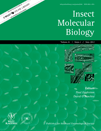
INSECT MOLECULAR BIOLOGY
Innovating Insect Science with Molecular PerspectivesInsect Molecular Biology, published by Wiley, is a leading journal dedicated to advancing the field of insect biology through molecular perspectives. With a prominent ISSN of 0962-1075 and an E-ISSN of 1365-2583, this journal has gained a significant reputation since its inception in 1992, showcasing a diverse array of research that spans across genetics, molecular biology, and specific aspects of insect science. As of 2023, it has achieved a remarkable categorization, recognized as Q1 in Insect Science and Q3 in Genetics and Molecular Biology, underscoring its pivotal role in fostering academic discourse at the intersection of biology and technology. The journal is indexed in esteemed databases with strong rankings, sitting at the 82nd percentile in Insect Science, which highlights the impactful research it publishes. While it currently does not offer open access, Insect Molecular Biology remains an essential resource for researchers, students, and professionals eager to explore the complexities of insect life at the molecular level. By disseminating innovative findings and methodologies, the journal significantly contributes to both theoretical and applied entomological research, making it a cornerstone for anyone passionate about the intricate world of insects.
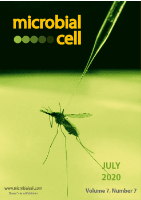
Microbial Cell
Connecting researchers to cutting-edge microbial insights.Microbial Cell is a distinguished open-access journal published by SHARED SCIENCE PUBLISHERS OG, focusing on the dynamic fields of microbiology, biochemistry, and molecular biology. Since its establishment in 2014, Microbial Cell has been at the forefront of disseminating cutting-edge research essential for advancing our understanding of microbial functions and interactions. With a commendable impact factor and ranking in the top quartiles (Q1 and Q2) across several categories, including Applied Microbiology and Biotechnology and Parasitology, this journal serves as an invaluable resource for researchers, professionals, and students alike. It features a comprehensive scope that encompasses the latest findings in genetics, cell biology, and virology, facilitating the academic community's access to high-quality peer-reviewed work. Microbial Cell not only contributes to advancing microbial sciences but also fosters an inclusive platform for knowledge sharing and collaboration in the scientific community.
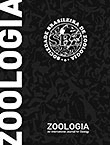
Zoologia
Championing Open Access in ZoologyZoologia, published by the SOC BRASILEIRA ZOOLOGIA and UNIV FEDERAL PARANA, is a premier open-access journal dedicated to the field of zoology and related disciplines. Established in 2009 and based in Brazil, this journal has quickly positioned itself as a vital resource for researchers, professionals, and students, providing a platform for innovative research and comprehensive reviews in animal science and zoology. With an H-index indicative of its growing citation impact and a current Scopus ranking placing it in the 46th percentile of its category, Zoologia focuses on increasing the visibility and accessibility of cutting-edge zoological research. The journal aims to advance the understanding of animal biology, ecology, and conservation, making it an essential read for those invested in animal science. As an open-access publication, it ensures that knowledge dissemination is unrestricted, fostering a collaborative scientific community striving towards impactful conservation and biodiversity initiatives.
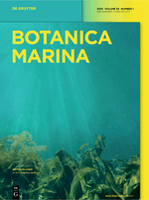
BOTANICA MARINA
Unveiling the secrets of marine biodiversity since 1959.BOTANICA MARINA, published by Walter de Gruyter GmbH, is a prestigious journal dedicated to the fields of aquatic science, ecology, and plant science, with an ISSN of 0006-8055 and an E-ISSN of 1437-4323. Since its inception in 1959, this journal has served as a vital platform for disseminating high-quality research, contributing significantly to the understanding of marine botany and ecosystems. Recognized for its impact, BOTANICA MARINA ranks in the Q2 quartile across multiple categories, reflecting its robust standing in the academic community. With its Scopus rankings placing it in the upper percentiles for Ecology, Evolution, Behavior and Systematics, as well as Aquatic Science and Plant Science, this journal is essential for researchers and professionals seeking to advance their understanding of marine environments. Although it currently does not offer Open Access options, access to its articles can lead to critical insights and developments in the study of marine biodiversity. The journal's commitment to quality and relevance makes it an invaluable resource for students and seasoned researchers alike.

BIOLOGICAL RESEARCH
Transforming research into accessible knowledge.BIOLOGICAL RESEARCH is a prestigious, peer-reviewed journal published by the Société de Biologie de Chile, dedicated to advancing the fields of Agricultural and Biological Sciences, Biochemistry, Genetics, and Molecular Biology, and Medicine. With an impressive ranking in the top quartile (Q1) in these categories as of 2023, this journal maintains high academic standards and visibility, making it a vital resource for researchers and professionals alike. Operating under an Open Access model since 2013, it ensures that research findings are freely accessible to a global audience, promoting the dissemination of knowledge and collaboration across disciplines. With a publication history dating back to 1992 and continued updates until 2024, BIOLOGICAL RESEARCH serves as a crucial platform for innovative research that impacts both scientific and healthcare communities. The journal’s commitment to quality and relevance is evidenced by its competitive performance in Scopus rankings, further solidifying its role as a leading journal within the biological sciences.

ACTA PROTOZOOLOGICA
Advancing Knowledge in Protozoology and EcologyACTA PROTOZOOLOGICA, published by Jagiellonian University, Institute of Environmental Sciences, is a premier journal dedicated to the study of protozoology, encompassing the biological complexities of protozoa and their ecological implications. With an ISSN of 0065-1583 and an E-ISSN of 1689-0027, this journal has been a vital resource for researchers and professionals in the fields of Agricultural and Biological Sciences since its inception in 1973, with coverage spanning from 1973 to 1990 and from 1992 to 2024. Recognized as a Q1 journal in its category for 2023, ACTA PROTOZOOLOGICA boasts high visibility and contributes significantly to the advance of knowledge and research in its discipline, as evidenced by its Scopus ranking of #103 out of 221 in Agricultural and Biological Sciences. While the journal is not open access, it maintains a rigorous selection process, ensuring that only the highest quality research is disseminated. Located at Gronostajowa 7, Krakow 30-387, Poland, the journal aims to foster communication among scientists and promote the study of protozoa in both academic and applied contexts, making it an essential source for anyone involved in biological sciences, ecology, and related research.

Insects
Advancing the Frontiers of Entomological ResearchInsects is a prominent open-access journal published by MDPI, dedicated to advancing research in the vibrant field of insect science. Since its inception in 2011, this journal has become a vital resource for academics and professionals alike, also ranked in the prestigious Q1 category within the Insect Science field by Scopus, achieving a remarkable rank of 26 out of 181 journals. With an ongoing convergence period from 2010 to 2024, Insects provides comprehensive coverage of various aspects of entomology, including but not limited to ecology, behavior, physiology, and applied entomology. Based in Switzerland, the journal promotes an open-access model, ensuring that vital research is readily available to researchers, practitioners, and students globally. This journal not only facilitates the dissemination of groundbreaking entomological research but also fosters collaboration and interdisciplinary dialogue in the field.

PERIODICUM BIOLOGORUM
Pioneering Discoveries in Biochemistry and GeneticsPERIODICUM BIOLOGORUM is a well-established interdisciplinary journal published in Croatia that focuses on advancing the fields of agricultural and biological sciences, biochemistry, genetics, and molecular biology, along with general medicine. With its roots dating back to 1980, the journal has been an essential platform for the dissemination of original research, reviews, and theoretical studies, fostering collaboration and dialogue among researchers within these diverse areas. While currently holding a Q4 quartile ranking in several categories, including agricultural and biological sciences, biochemistry, and general medicine, it provides a significant opportunity for authors seeking to contribute to the body of knowledge in these sectors. Although Open Access options are not available, the journal's rich history and commitment to quality scholarship make it a valuable resource for professionals, researchers, and students alike, aiming to stay informed about current trends and advancements in biological research and its applications.
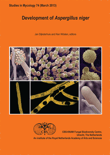
STUDIES IN MYCOLOGY
Transforming Mycology Through Open Access ResearchSTUDIES IN MYCOLOGY is a premier journal dedicated to advancing research in the field of mycology, published by the renowned WESTERDIJK FUNGAL BIODIVERSITY INSTITUTE. With an impact factor that places it in the top quartile (Q1) of both Agricultural and Biological Sciences and Plant Science categories, it holds a prestigious position in the scientific community, ranking #1 out of 193 in its field as per Scopus metrics. Since its transition to Open Access in 2008, it has made significant strides in disseminating high-quality research widely, fostering a greater understanding of fungal biodiversity and its ecological impact. Covering a broad spectrum of topics related to mycology, the journal aims to provide researchers, professionals, and students with a platform for sharing innovative findings, stimulating academic discourse, and promoting collaborative efforts within this vital area of study. Hailing from the Netherlands, STUDIES IN MYCOLOGY serves as an invaluable resource for exploring the complexities of fungi, their interactions with various ecosystems, and their practical applications in agriculture and beyond.